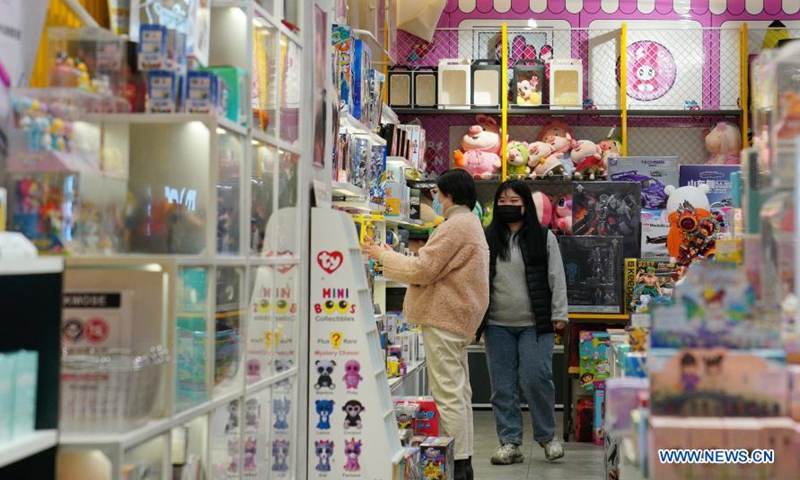
Customers are seen at a shopping mall in Qiaoxi District of Shijiazhuang, north China's Hebei Province, Feb. 5, 2021. Many commercial complexes and shopping malls in Shijiazhuang resumed operation in an orderly manner on Friday. Photo:Xinhua
China's retail sales extended contraction in April due to the greater-than-expected impact of new COVID-19 flare-ups in several major urban hubs, according to official data on Monday.
However, fundamentals of the world's second-largest economy remains solid despite rising downward pressure, and more support measures, including fiscal and monetary policies, will help boost consumption as well as broader economic development, officials and experts said.

Change in retail sales in China Graphics: Xiong Xiaoying/GT
Retail sales, a main gauge of consumption, fell 11.1 percent year-on-year to 2.95 trillion yuan ($433.9 billion) in April, data from the National Bureau of Statistics (NBS) showed on Monday.
From January to April, retail sales dropped 0.2 percent year-on-year to 13.81 trillion yuan. Online sales increased 3.3 percent during the period. Online sales of physical goods reached 3.29 trillion yuan, accounting for 23.8 percent of total retail sales.
Overall, the impact on domestic economic activity is likely to be short-term, with the fundamentals for steady and long-term growth unchanged, and the trend of high-quality development intact, Fu Linghui, a spokesperson from the NBS, said at a press briefing.
Fu further noted that there are many favorable conditions pointing toward the stabilizing of China's economy to achieve its economic and social development goals.
"Domestic consumption contracted in the past month as consumers were prone to buy only daily necessities amid lockdowns in some cities like Shanghai, while disrupted supply chains and imported inflation also curbed spending," Pan Helin, joint director of the Research Center for Digital Economics and Financial Innovation affiliated with Zhejiang University's International Business School, told the Global Times on Monday.
In the first four months, sales of daily necessities showed relatively fast growth, with the sales of beverages, edible oil and food, as well as drugs growing 10.4 percent, 9.5 percent and 8.8 percent, respectively, at major enterprises, according to the NBS.
Stimulating consumption is important, as it's not enough to rely on infrastructure investment to smooth internal circulation, said Li Xunlei, chief economist at Zhongtai Securities, at the Tsinghua PBCSF Chief Economists Forum in Beijing on Saturday, which focused on China's economic and policy outlook in a turbulent 2022.
As a major driver of the domestic economy, consumption still serves as a ballast stone to stable economic growth this year despite challenges posed by COVID-19 resurgences. According to the NBS, final consumption expenditure contributed 69.4 percent of GDP in the first quarter of 2022.
To maintain China's leading role in economic recovery while conducting anti-pandemic work, the authorities should give play to the normal scope of fiscal and monetary policies, actively planning policy tools and make further adjustments when necessary, Guan Tao, BOC International's global chief economist, told the Global Times.
Experts are calling for more proactive fiscal policies while optimizing fiscal expenditure to stabilize market demand and expectations.
China has intensified tax refunds and cuts this year, which are expected to reach 2.5 trillion yuan, but existing fiscal measures are mainly intended to bring benefits for market entities, with expenditure in the consumption sector insufficient, Li said, advising further issues of consumption coupons.
China's Ministry of Commerce spokesperson Shu Jueting said at a press conference on Thursday that the ministry will carry out a new round of measures to spur domestic consumption and step up efforts to boost the recovery and upgrading of consumption so as to bolster economic activities.
In the first quarter of 2022, at least 3.4 billion yuan worth of consumption coupons went to residents in 20 provinces and municipalities, data compiled by the Global Times showed.
Recently, local governments have come up with expansive measures to inject confidence into businesses and consumers as the country strives to achieve the annual economic and social development goals.
"Consumption in many areas is expected to gradually resume in May, but a real recovery may come in June when economic activities restart after the latest round of COVID-19 outbreaks are put under effective control," Pan said.





